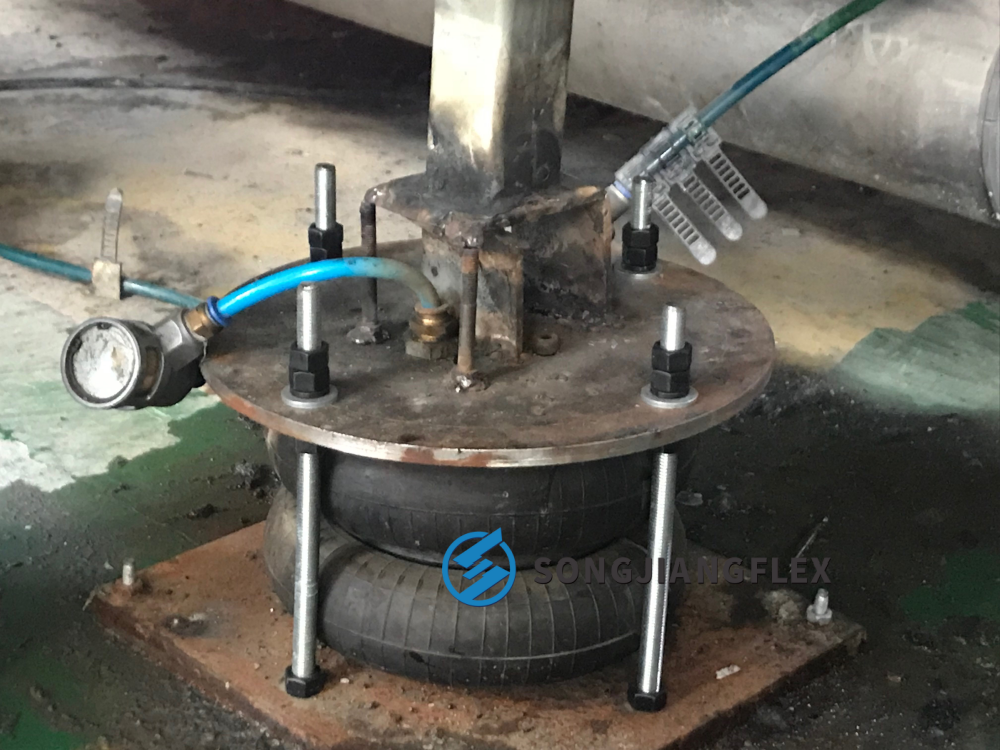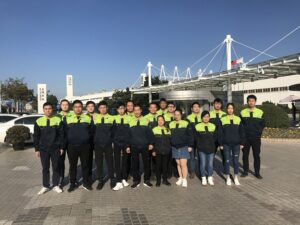Why Do Heavy Crushing Machines Require Air Spring Vibration Isolators?
Heavy crushing machines generate intense vibrations that reduce component life and safety. Without proper isolation, maintenance costs rise—air spring vibration isolators effectively absorb shocks and stabilize operations.
Air spring vibration isolators effectively absorb strong vibrations from heavy crushing machines, reducing noise, minimizing component wear, and improving production efficiency. They are essential components for crushers, vibrating feeders, and screening equipment.
Let’s explore how air springs work, their benefits, and why they are crucial for heavy crushing equipment.
1. What Problems Do Heavy Crushing Machines Face Without Vibration Isolation?
Without vibration isolation, heavy crushing machines experience excessive vibrations, increased noise, loose components, and higher maintenance costs.
Air spring vibration isolators reduce transmitted vibrations and resonance, preventing early equipment failure.
Uncontrolled vibrations can damage bearings, gears, and machine frames, cause structural cracks, and increase energy consumption. Long-term exposure also reduces production efficiency and increases downtime, making vibration isolation indispensable.
2. How Do Air Spring Vibration Isolators Work in Crushers?
Air springs provide flexible support using compressed air and rubber elasticity, absorbing shocks from heavy machinery operation.
They dampen vibrations, maintain stability, and prevent transmission to foundations and surrounding equipment.
Air spring technology relies on gas compressibility and rubber flexibility to adapt to frequent impact loads. This combination ensures consistent isolation even under high-frequency vibration, protecting both the crusher and the facility.
3. What Are the Advantages of Air Springs Compared to Metal Springs in Crushers?
Compared to metal springs, air springs offer lower natural frequency, higher adjustability, and superior adaptability for heavy machinery.
They provide longer service life, adjustable load support, and enhanced vibration isolation efficiency.
System spring vs rubber isolators comparisons show that air springs outperform metal alternatives in longevity, maintenance frequency, and vibration reduction, making them ideal for heavy crushing equipment.
4. Which Crushing Equipment Commonly Uses Air Spring Isolators?
Various crushing and screening equipment widely adopt air spring vibration isolators.
Jaw crushers, cone crushers, impact crushers, sand making machines, and vibrating screens all benefit from air springs.
Each machine type experiences unique vibration patterns. Air springs help absorb shocks, reduce structural stress, and maintain optimal operational efficiency across different crusher models.
5. How Does Vibration Affect the Longevity of Crusher Components?
Strong vibrations significantly shorten the life of bearings, gears, and frames.
Air springs lower vibration impact, extending component service life and reducing maintenance frequency.
Repeated vibration causes wear, loosening, and fatigue failures. Proper air spring installation protects critical parts, ensures consistent operation, and reduces production interruptions.
6. Can Air Springs Be Adjusted for Different Load Conditions?
Air springs are flexible and can be adjusted to match varying load requirements of crushing machines.
By modifying air pressure, optimal vibration isolation is achieved, adapting to different operational conditions.
Pressure adjustment allows crushers to handle fluctuating loads without compromising isolation efficiency. Operators can fine-tune air springs for maximum protection under both light and heavy material processing.
7. What Installation Considerations Are Needed for Air Springs in Crushers?
Installation conditions, support points, and foundation anchoring impact vibration isolation effectiveness.
Proper installation ensures maximum air spring performance and longer service life.
Incorrect installation can reduce isolation efficiency or cause premature wear. Consider adequate spacing, secure attachment, and foundation stability to maintain optimal performance.
8. How Do Air Springs Reduce Noise in Crushing Operations?
Vibration is a primary source of industrial noise, and isolation directly affects plant environment.
Air springs significantly reduce operational noise, improving workplace comfort and safety.
Noise reduction benefits include compliance with environmental regulations, improved worker health, and minimized disturbance to nearby facilities, while maintaining effective vibration control.
9. Are Air Spring Vibration Isolators Cost-Effective Compared to Other Solutions?
Considering both initial cost and long-term maintenance, air springs offer clear advantages.
Compared to rubber pads or metal springs, air springs last longer, require less maintenance, and provide better overall value.
Reduced downtime, lower component wear, and fewer replacements make air springs economically advantageous, offering high return on investment for heavy machinery operators.
10. How Do Air Springs Perform Under Harsh Industrial Conditions?
Crusher environments involve high temperatures, dust, humidity, and frequent impacts.
Air springs resist heat, dust, and frequent shocks, ensuring reliable performance.
Durable materials, proper sealing, and robust design enable air springs to maintain performance in harsh conditions, protecting both machinery and production continuity.
11. Can Air Springs Be Used in Combination with Other Vibration Isolation Systems?
Multi-layer isolation systems enhance overall equipment protection.
Air springs can be combined with rubber pads or metal springs to form hybrid vibration isolation solutions.
Combination systems provide additional damping and shock absorption, suitable for extremely heavy or irregular vibration patterns, offering customized protection for specialized crushing operations.
12. How Does Air Pressure Influence Vibration Isolation Efficiency?
Air pressure directly affects air spring isolation performance.
Adjusting pressure optimizes vibration damping and extends machinery lifespan.
Higher pressure increases load capacity but may reduce damping; lower pressure enhances isolation but limits load support. Operators must balance pressure settings based on machine weight and vibration levels.
13. Which Maintenance Practices Ensure Air Springs Last Longer in Crushers?
Proper maintenance extends air spring lifespan and preserves vibration isolation performance.
Regularly check air pressure, rubber surfaces, and support structures to prevent failures.
Maintenance includes inspecting for leaks, surface wear, and secure mounting. Timely adjustments and preventive checks reduce downtime and maintain consistent isolation efficiency.
Summary
Air spring vibration isolators are essential for heavy crushing machines, enhancing stability, safety, and cost-effectiveness while ensuring reliable, long-term operation under harsh industrial conditions.





